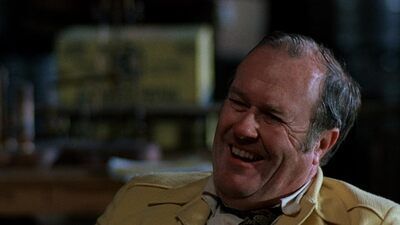Walsh thought of the part as a modern spin on the kinds of parts Sidney Greenstreet used to play, but Greenstreet was good company, even when playing bastards. You wouldn’t want to be with the detective for the length of an elevator ride. He has the wheezing laugh of a chimpanzee and a demon’s leer, and yet the miraculous thing is you start to suspect that the violence he’s willing to commit is a last resort. He’s somehow not as crazy as he seems, just desperate, greedy, and unlucky. Lying on his back in his yellowing suit, clutching his bleeding gut, his piercing blue eyes really registering for the first time; this is the kind of character you needed an actor like Walsh to create. He’s a real guy you could run into and repel from. He won the independent spirit award for best leading performance, the first ever, and the rest of his career was assured.
Walsh would never get another part like the one in “Blood Simple,” but he would make movies his if the directors and/or his co-stars weren’t careful. He walks off with the likes of Joseph Zito’s unforgivable “Red Scorpion” and manages to fully project his personality into a voice role in the classic animated fable “The Iron Giant”. Parts in high-and-low-profile films alike kept him busy enough to rack up hundreds of film and television credits. He played cops and judges and functionaries and uncles in films like Hyams’ “Narrow Margin,” Alan Rudolph’s “Equinox,” Charles Burnett’s “The Glass Shield,” and Joel Schumacher’s “A Time to Kill”. “They weren’t all Hamlet,” Walsh later confessed. Even die-hard fans like Roger Ebert, who coined the famous Stanton-Walsh Rule, currently being cited in every obituary of the towering actor, which states that no film with either Walsh or Harry Dean Stanton can be all bad, had to admit he strayed from time to time. Specifically in Wild Wild West, directed by his Blood Simple cinematographer Barry Sonnenfeld, a film and performance best forgotten, if it were possible to do so. Similarly no one rushed to turn in anniversary pieces for the likes of “Snow Dogs” or “Chairman of the Board,” despite defensible work from the actor in them.
As he aged his welcome, oblong presence seemed less like good casting and more like a family reunion. Brief supporting turns in “The Odd Life of Timothy Green,” “Calvary,” and “Knives Out” weren’t challenging for the actor or his audience. It was nice to see him enjoying his reputation and the easy work, not that he ever phoned anything in. It was a gentle refutation of what he said in an interview with Criterion in the special features for their release of “Blood Simple”: “When I come on screen you don’t see Emmett Walsh, you see whatever he’s supposed to be playing…that can’t be taught. 80% of acting can more or less be taught. The other 20% that’s the gift.” M. Emmett Walsh’s stature, voice, unconventional looks, and his chops in front of a camera were a gift. What he did with them? That was his magic.

